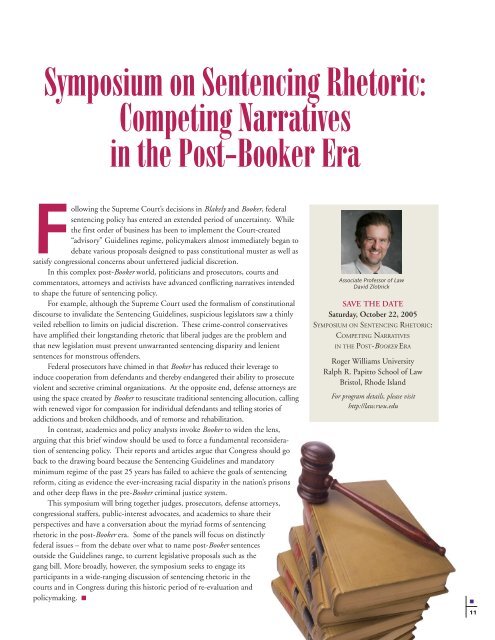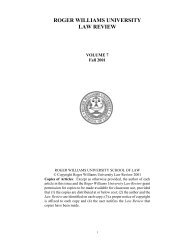AMICUS Vol. 4, No. 2 (Fall 2005) - Roger Williams University School ...
AMICUS Vol. 4, No. 2 (Fall 2005) - Roger Williams University School ...
AMICUS Vol. 4, No. 2 (Fall 2005) - Roger Williams University School ...
Create successful ePaper yourself
Turn your PDF publications into a flip-book with our unique Google optimized e-Paper software.
Symposium on Sentencing Rhetoric:<br />
Competing Narratives<br />
in the Post-Booker Era<br />
Following the Supreme Court’s decisions in Blakely and Booker, federal<br />
sentencing policy has entered an extended period of uncertainty. While<br />
the first order of business has been to implement the Court-created<br />
“advisory” Guidelines regime, policymakers almost immediately began to<br />
debate various proposals designed to pass constitutional muster as well as<br />
satisfy congressional concerns about unfettered judicial discretion.<br />
In this complex post-Booker world, politicians and prosecutors, courts and<br />
commentators, attorneys and activists have advanced conflicting narratives intended<br />
to shape the future of sentencing policy.<br />
For example, although the Supreme Court used the formalism of constitutional<br />
discourse to invalidate the Sentencing Guidelines, suspicious legislators saw a thinly<br />
veiled rebellion to limits on judicial discretion. These crime-control conservatives<br />
have amplified their longstanding rhetoric that liberal judges are the problem and<br />
that new legislation must prevent unwarranted sentencing disparity and lenient<br />
sentences for monstrous offenders.<br />
Federal prosecutors have chimed in that Booker has reduced their leverage to<br />
induce cooperation from defendants and thereby endangered their ability to prosecute<br />
violent and secretive criminal organizations. At the opposite end, defense attorneys are<br />
using the space created by Booker to resuscitate traditional sentencing allocution, calling<br />
with renewed vigor for compassion for individual defendants and telling stories of<br />
addictions and broken childhoods, and of remorse and rehabilitation.<br />
In contrast, academics and policy analysts invoke Booker to widen the lens,<br />
arguing that this brief window should be used to force a fundamental reconsideration<br />
of sentencing policy. Their reports and articles argue that Congress should go<br />
back to the drawing board because the Sentencing Guidelines and mandatory<br />
minimum regime of the past 25 years has failed to achieve the goals of sentencing<br />
reform, citing as evidence the ever-increasing racial disparity in the nation’s prisons<br />
and other deep flaws in the pre-Booker criminal justice system.<br />
This symposium will bring together judges, prosecutors, defense attorneys,<br />
congressional staffers, public-interest advocates, and academics to share their<br />
perspectives and have a conversation about the myriad forms of sentencing<br />
rhetoric in the post-Booker era. Some of the panels will focus on distinctly<br />
federal issues – from the debate over what to name post-Booker sentences<br />
outside the Guidelines range, to current legislative proposals such as the<br />
gang bill. More broadly, however, the symposium seeks to engage its<br />
participants in a wide-ranging discussion of sentencing rhetoric in the<br />
courts and in Congress during this historic period of re-evaluation and<br />
policymaking. ■<br />
Associate Professor of Law<br />
David Zlotnick<br />
SAVE THE DATE<br />
Saturday, October 22, <strong>2005</strong><br />
SYMPOSIUM ON SENTENCING RHETORIC:<br />
COMPETING NARRATIVES<br />
IN THE POST-BOOKER ERA<br />
<strong>Roger</strong> <strong>Williams</strong> <strong>University</strong><br />
Ralph R. Papitto <strong>School</strong> of Law<br />
Bristol, Rhode Island<br />
For program details, please visit<br />
http://law.rwu.edu<br />
11

















